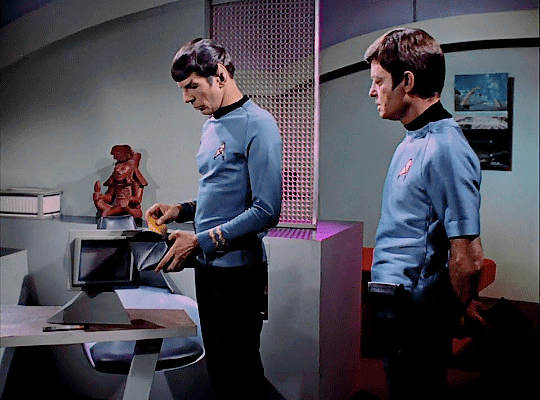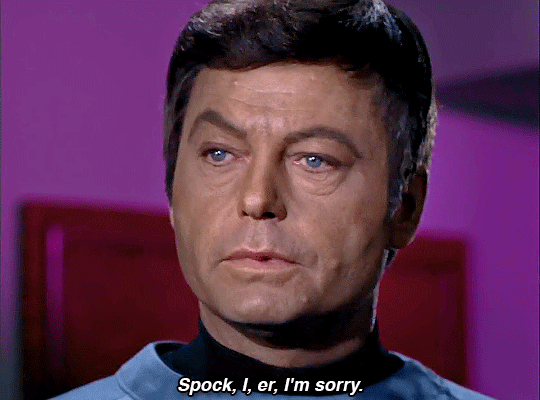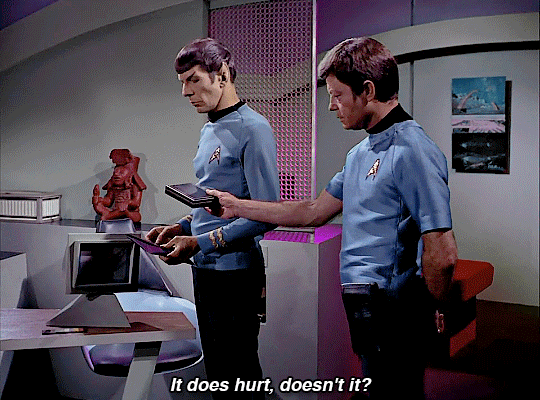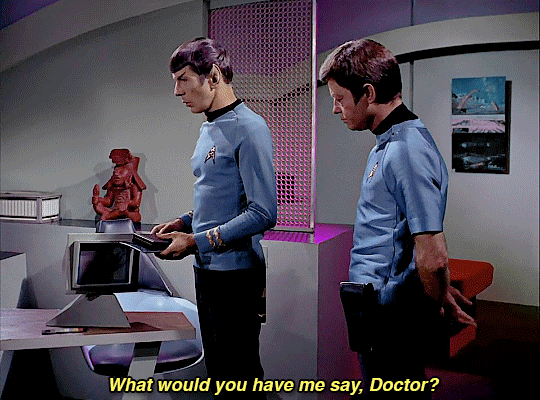pfp - @jestercircus | banner - frances quinlan
Last active 3 hours ago
Don't wanna be here? Send us removal request.
Text
omg i always forget kirk was gone for FIFTY EIGHT DAYS in paradise syndrome UGH. I wish that episode wasn't so problematic it has such good spirk moments
Star Trek episode idea: Can We Check on Spock Please
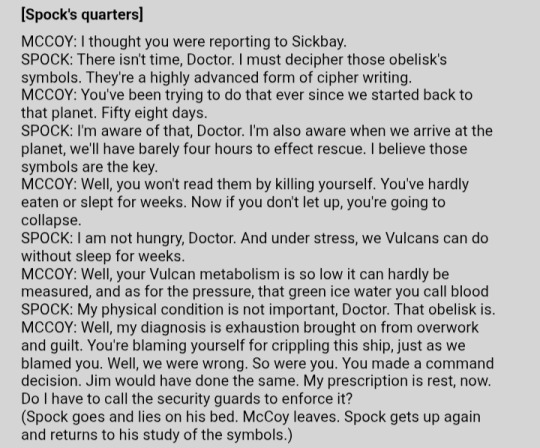


21 notes
·
View notes
Text

"If I hadn't tried, the cost would have been my soul."
195 notes
·
View notes
Text





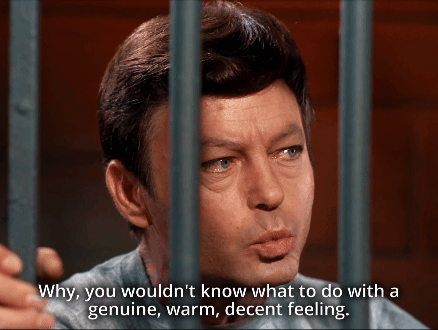




Star Trek, Bread and Circuses (2x25)
#mccoy (tearfully): well. if we're going to die. there's something you should know... you're a fag#<- LMAOOOOOOOO#star trek
2K notes
·
View notes
Text
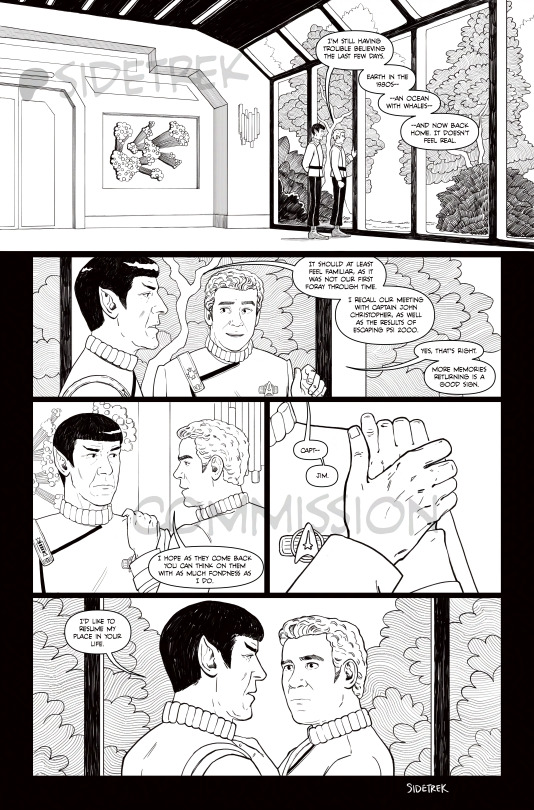

A post-TVH commission for @honestlysecretjellyfish! They wanted a little comic where Spock tells Kirk he remembers they were bondmates 🥹
330 notes
·
View notes
Photo
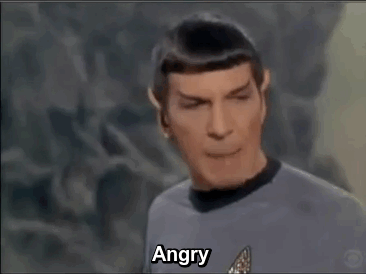
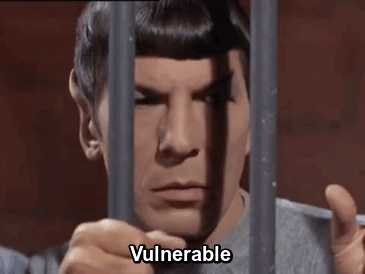
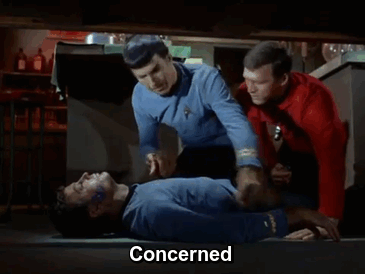
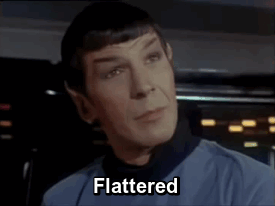

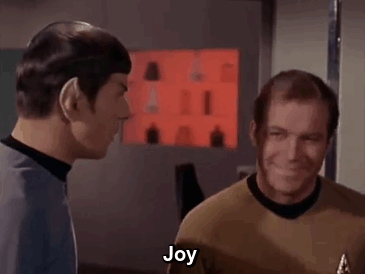
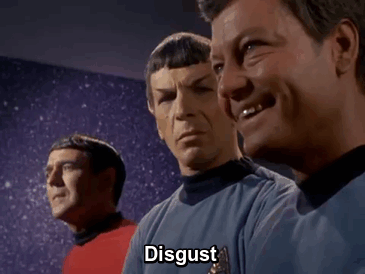
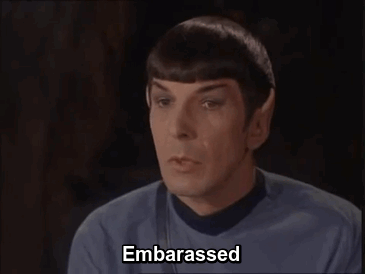
I get angry when I see that “Many Emotions of Mr Spock” poster. It just fuels people’s false belief that Spock is totally emotionless except while drugged. He suppresses them, but they are not absent. Here are some gifs of Spock’s real emotions peeking through.
16K notes
·
View notes
Text
Transferring an old twitter thread of mine here to make it easier to read: I had some dipshit straight Spock truther in my mentions, so in the group chat we were talking about the Hays Code and how Star Trek began before it was abolished in 1968.
By 1966 when it premiered, there was already a lot of pushback, but showrunners were still at the mercy of whatever studio was putting their work out there, and especially with something that was already pushing the envelope, the studio likely wouldn't let them get away with too much. So even if Roddenberry and/or the writers had wanted to make Spock's queerness more obvious, the studio would have shut it down. Star Trek got away with a LOT of the progressive/queercoded stuff they did by making it look innocuous to a casual viewer, but obvious to anyone watching closely. For example, in "City on the Edge of Forever", you have Jim saying how "let me help" is an even more powerful statement than "I love you", and then in the very NEXT episode Spock is saying "let me help" to Jim. But I digress. There's a lot in S3 that's less subtle overall. For example, there have always been instances where it’s implied that Jim seduced someone on mission in order to get information or gain trust (honeypotting), but the first time it’s really clear that sex occurred is in "Wink of an Eye" when we see him sitting on the bed putting his boots back on, and the woman at his dresser fixing her makeup. By this point, the Hays Code has been abolished in favour of the MPAA rating system. With that in mind, I want to talk about how all of Spock's mind melds with Jim occur in S3, which ran from late in 1968 to 1969.
We've seen Spock perform mind melds before, but not until "The Paradise Syndrome" do we see him do so with Jim. Context implies this is not only the first time we are shown it as viewers, but also the first time they've done it. Spock is visibly affected by Jim's mind, to the point that by the time he breaks the connection, he's disoriented, panting and limp. When McCoy asks if he's all right, he says, "His mind... he is... an extremely dynamic individual." You don't have to try very hard to view this as sexual. And we know that touching minds is a form of intimacy for Vulcans, because we've been shown and told this previously, in "The Enterprise Incident" when Spock and the Romulan Commander touch fingers rather than kiss in the human way, and in previous instances where Spock performs a mind meld.
The first time we as viewers are shown the meld is in S1, with "Dagger of the Mind". This one is presented as very mystical and witchy, with Spock explaining the act to McCoy, who looks on in sort of a terrified fascination as he melds with Dr van Gelder. But even here there is an energy to it that is very sensual. And in this, and other instances of Spock performing the meld before "The Paradise Syndrome", it's always very clear when he's totally in control of it and when he isn't. Melds are presented as emotionally draining for him, yes, in "Devil in the Dark" and "The Changeling", but it's not until his meld with Jim that we get the impression he was affected on a personal level. And we can believe at this point it's because he and Jim do have a very close relationship. It's been set up throughout the entire series! Of course having their minds join would affect him personally!
Even if it's simply a coincidence that this aligns with the abolition of the Hays code, this couldn't really have been shown earlier than it was, because they'd set up this incredibly meaningful and flirtatious relationship between Jim and Spock throughout the series. If they'd done what they did in "The Paradise Syndrome" in S1, there might not have been a S2! Can you imagine if the first meld we see were between Spock and Jim, after Spock goes on and on about the intimacy of mind melds and how it's a sacred act for Vulcans? After we've watched the two of them in episodes like "The Naked Time" and "The Enemy Within"? There's no way it couldn't be read as sexual, or at least deeply emotional. They had to first establish that Spock could perform a mind meld for many other reasons and purposes without it having a lasting effect on him.
By the time we reach "Turnabout Intruder", Spock needs only a second or two with his fingers on the face of Janice Lester to determine that it's Kirk's mind inside her body. The argument, of course, is that it would be obvious to anyone who was able to touch his mind that it was him and not Lester, but the surrounding context is also important. Just before the meld, Kirk says, "You are closer to the captain than anyone in the universe. You know his thoughts." This, again, on the surface, might read to a casual viewer as just the expected closeness of a captain and his devoted first officer. But the ease with which Kirk uses this particular choice of words indicates that Spock is by this point familiar with his literal thoughts via the mind melds they've shared (explicitly in "The Paradise Syndrome" and "Spectre of the Gun", and others perhaps not shown but implied by action or dialogue), and that Kirk feels comforted by this.
Spock is the only one who can truly see him in this incredibly vulnerable moment— what could be more intimate than that?
264 notes
·
View notes
Text
what really bothers me about generations is like picards brother AND nephew die in a FIRE presumably on earth?????? that feels needlessly morbid considering we are given no details on the accident. like you'd think FATAL mystery fires would be nonexistent in the 24th century
#obviously accidents still happen in the future but id them to be explained lol#i do like picards character arc in this movie and seeing him completely break down was really shocking#i think it would have been cool if his brother and nephews death were presented as preventable#then that could have been used as his motive for doubting his choices for a career in starfleet#him wanting a family all of a sudden felt a little cheap#star trek the next generation#star trek generations#star trek tng#star trek
8 notes
·
View notes
Text
ty for tagging me :)
currently reading: spirk fic and The Haunting of Hill House
last song: the gambler by fun.
last film: star trek nemesis
last show: currently on season 2 of star trek deep space 9
sweet/savory/salty: ALL!!
tea or coffee: iced coffee exclusively !!!!
working on: moving across country </3
don't feel like tagging so anyone can add!
TAG NINE PEOPLE YOU WANT TO GET TO KNOW MORE
tried to reblog the original post but it was gone so here we are i guess. thanks for tagging me leigh!!!!! @poemeater <3 i love you to pluto and back come kiss me now
currently reading: nothing actually. walk of shame
last song: man in the mirror — michael jackson
last film: captain america brave new world
last series: new girl season 3, mha season 2 (rewatch), wbk s2
sweet/savory/salty?: savory + salty!!! but i would give up both kidneys for some cinnamon sugar pretzels rn
tea or coffee: tea always
working on: packing to move states in july, weeding through some rough friendships that no longer serve me, picking up guitar again, and. well. kinktober ‘25
no pressure tags 🤍 @carminechrollo @admiringlove @madaqueue @cheralith @bouqette @mochiqa @mosskissed @storiesoflilies @toadba @tokeposts @hiraethwrote sorry if you’ve been tagged i tried to choose people i haven’t tagged in awhile/at all hehe
649 notes
·
View notes
Text
You know, when I first started watching Star Trek, I wasn't expecting to watch Spock cum in public because his boy toy figured out how to make gunpowder, but here we are
153 notes
·
View notes
Text
my favorite thing about star trek 2009 is that it is honestly EXACTLY what you would expect to happen if in 2005 you gave both a mckirk shipper and a spirk shipper the prompt "Pre-slash adeventure fic, Starfleet Academy AU meet-ugly", combined them into one story, then put it through like 3 separate rewrites from people with extremely varying levels of star trek knowledge
224 notes
·
View notes
Text
While talking to N recently about Star Trek (all my recent chatting leads to this, and I'm pretty sure my sister hates it), we got caught up in the topic of utopianism and how it's depicted in TOS, which got me thinking about a couple of things, so it's a little not-really-quality-near-philosophical rambling...
We tend to perceive the idea of utopia as that promised land, that ultimate outcome to which humanity should strive, the pure creation that is opposed to the absolute destruction of dystopia. But in our multi-tonal, ambiguous, contradictory world, where change is the only constant and where the constancy of laws is only an attempt to resist the chaos of entropy, this forever remains in the realm of the impossible, and utopian becomes a household word for naive, idealistic dreams, completely disconnected from reality. And in this perception, in my opinion, we lose the most important idea that the concept of utopia carries, and which completely changes the angle of its perception and attitude towards it. Utopia is not an ultimate outcome, but a striving towards it. Not the destination, but the journey itself. The path that we can choose. We'll never reach this abstract ideal world, because it contradicts existence itself, but we can try to become better and kinder ourselves.
And that's the utopianism of the original Star Trek. The 23rd century we're shown (obviously) isn't perfect, but it's striving for it. TOS, and this is probably the most accurate comparison I've found for myself, is a kind of message in a bottle left to us by Roddenberry. It tells us not "this is what the ideal future should be like," but "this is what the path to it should be like." And there is a noticeable difference between these two things.
The very structure of the plot in TOS, its similarity to the Odyssey in this journey lost in time and space (and emphasized isolated in it), makes it almost mythological. This is read in how the Enterprise, making its way through deep space, like that bottle with a message, carries within itself all the best that humanity is, but in a certain way, separates itself from the rest of the world. And this brings me back to thoughts that the 23rd century's reality that we are shown (obviously) isn't perfect, and that a (quite unconventional) captain like Kirk, as well as his (no less unconventional) entire crew, is still more of an exception than a rule there. Contrary to my expectations (largely dictated by what I've seen about him before), TOS Kirk as a character is generally very far from this idea of Starfleet's golden boy and the model captain. That's what you could say about Pike, but Kirk, while obviously a good captain, is much more of a pirate than a soldier. In general, they are both, Kirk and Spock are not portrayed as people who truly fit into the environment in which they were raised. And although this is more logically explained in Spock, who has objective difficulties with (not) belonging to both of his heritages and is constantly in a state of in-between, it is in Kirk that it's especially feeling, in his, let's say, absolute impossibility of being not himself in the full (rather theatrical) manifestation of this, being inscribed in any specific normative role, which is noticeable both in his gender ambivalence/personal flexibility/amazing ability to change and in his frank discomfort with any roles that restrict his deeply personal freedom, and strangely enough, his integrity as a character is most fully expressed precisely in this chameleon-like versatility.
It was in @anghraine 's post about Kirk's queerness : "This is not only a vision of the future in general. It's a vision of the future that is decidedly imperfect but better enough to produce someone like this as a starship captain." and it very aptly and succinctly captures the very essence of what TOS is, and it really stuck in my head. Both K and S face some non-acceptance and rejection from others throughout the series, and they both have this "I only belong here on the bridge next to my people" mentality, not so much because it's their professional choice, but because it's really the only place where they can be themselves most fully, which feels like a certain conflict with the outside world (not that Vulcans or most Starfleet members are really particularly unorthodox), but at the same time, they can both exist in this space as they are, and be able to influence changes and try to make the world a little better, more open, more just, and less restricted. And importantly, while they are undoubtedly not-like-anyone different, they are not really forced to change themselves in TOS.
And this was, in my opinion, completely lost in the sequel films [esp post-Roddenberry], which gave rise to both subsequent Kirk drift, and the general gradual moving away from utopianism and the emergence of Section 31, and which after TOS feel like a grounding, giving me a rather joyless feeling of longing for a lost dream, and where all the characters, and especially Kirk, try to fit into some much more socially acceptable, normative roles, thus seemingly reinforcing this concept of returning from heaven to earth, that they as they were in TOS cannot fit into this environment, this bitter understanding that there are things that will never be acceptable and understandable in society, there are parts of you that you have to lose, hide to survive in the real world, and it's all leaving TOS behind as a long-forgotten dream, a stolen moment of fullness of being. It feels less like the still imperfect, but moving towards it, reality of the original series, and more like the not-at-all-utopian side of 80s/familiar present. And while the films themselves are good, and have their own very special (a little bit sad-painful) charm, they completely contradict TOS in something very important to me personally, which makes me look at these things absolutely separately from each other (N and I are in the process of watching films now, and it gives us both mixed feelings). Even if we read this as an attempt to show the transition from youth to maturity, this inevitability of growing up-aging in which you must necessarily change, lose something visceral about yourself, and instead take on some socially acceptable role, I find this a rather outdated and not very healthy concept, because normal growing up-aging is not about losing yourself at all, but about returning to your true self, and taking into account everything that was shown to us in TOS, psychological changes that have occurred in characters in films are quite sad, and I really want to ask what happened during that time that made this possible? (envy of Star Wars' success and the lust for money, obviously, but that's another story).
In any case, I find that I discovered TOS somehow very timely for myself, and although I often see how TOS is perceived as a non-serious, pretty awkward, funny thing, I find it surprisingly meaningful, and for me, it's objectively a much more interesting thing to reflect on, and a much more important thing to take into the future.
Maybe it's all Roddenberry's spirit whispering in my ear that I should get back into filmmaking (and finally finish my deferred master's degree) so that one day I can reshoot this story.
#loveeee the utopia themes in tos really wish it was more prevelant in the other series#ty op this was a good read!!#star trek
28 notes
·
View notes
Text
nothing makes me feel more alive than reading fanfiction that makes me feel physically sick 👍
#But really angsty or sad fics make me feel nauseous 😭#<- OMG LITERALLY SAME....#and that sick feeling is accompanied by the fic invading all thought processes#ive made the mistake of reading heavy angst when i have shit to do and it just halts any productivity 😭#fanfic is such a blessing though like im getting this mood altering experience for free?????
4 notes
·
View notes
Text
you want me to come out? the thing that killed Castiel?
93 notes
·
View notes
Text
Every once in a while in tos, they make Spock faint, but the way he does it, is really just: fall to the side stiff as a plank, and it looks hilarious
#everyone always describes spock as graceful in fic but this makes me seriously doubt that#star trek
159 notes
·
View notes
